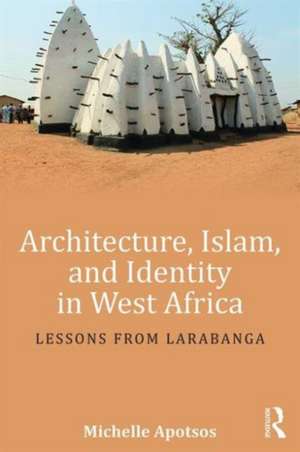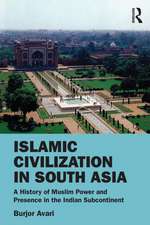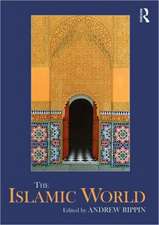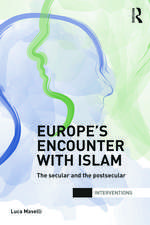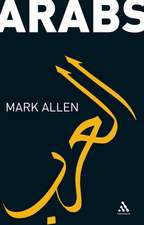Architecture, Islam, and Identity in West Africa: Lessons from Larabanga
Autor Michelle Apotsosen Limba Engleză Paperback – 16 mai 2016
| Toate formatele și edițiile | Preț | Express |
|---|---|---|
| Paperback (1) | 489.26 lei 6-8 săpt. | |
| Taylor & Francis – 16 mai 2016 | 489.26 lei 6-8 săpt. | |
| Hardback (1) | 1277.27 lei 6-8 săpt. | |
| Taylor & Francis – 10 mai 2016 | 1277.27 lei 6-8 săpt. |
Preț: 489.26 lei
Nou
Puncte Express: 734
Preț estimativ în valută:
93.62€ • 98.01$ • 77.46£
93.62€ • 98.01$ • 77.46£
Carte tipărită la comandă
Livrare economică 05-19 aprilie
Preluare comenzi: 021 569.72.76
Specificații
ISBN-13: 9781138192461
ISBN-10: 1138192465
Pagini: 230
Ilustrații: 122
Dimensiuni: 156 x 234 x 48 mm
Greutate: 0.45 kg
Ediția:1
Editura: Taylor & Francis
Colecția Routledge
Locul publicării:Oxford, United Kingdom
ISBN-10: 1138192465
Pagini: 230
Ilustrații: 122
Dimensiuni: 156 x 234 x 48 mm
Greutate: 0.45 kg
Ediția:1
Editura: Taylor & Francis
Colecția Routledge
Locul publicării:Oxford, United Kingdom
Public țintă
PostgraduateCuprins
Dedication. Acknowledgments. Preface. Foreword Barbaro Martinez-Ruiz Introduction: Learning from Larabanga 1. Locating Larabanga: Architecture and Contemporary Islamic Identity in West Africa 2. The Road to Larabanga: A Short History of Afro-Islamic Architecture 3. Mallams, Mosques, and Mystic Stones: The Story of Larabanga 4. Building Across Borders: Larabanga in Transition 5. Conclusion: Lessons from Larabanga: The Future of Islam and the Built Environment in West Africa List of Figures. Image Credits. Bibliography. Index
Notă biografică
Michelle Apotsos is an Assistant Professor in the Department of Art at Williams College, Massachusetts, USA, where she specializes in African architecture and the arts of the Afro-Islamic world. Her research focuses on the intersections between Afro-Islamic identity, architecture, and modernization as they are occurring in contemporary Africa. She received her PhD from Stanford University, USA, in 2013.
Recenzii
"This book is the most recent monograph written in the anthropologically inspired tradition established in some of the first postindependence histories of African architecture by Western scholars including Labelle Prussin and Suzanne Preston Blier ... Apotsos posits her nuanced and detailed analysis as a methodological and historiographic model for studying the Islamic architectures of West Africa ... She has produced a compelling and innovative account that has much to offer both specialist and nonspecialist readers and significantly enhances the field of Africanist architectural history." - Itohan Osayimwese, Brown University, USA, College Art Association Reviews
"Apotsos gives us a rich and nuanced story of one northern Ghanaian community’s Islamic architecture and the dynamic relationships between its built environment and local Islamic practices and cultural identities. While these relationships are located within the long history of Islam in West Africa they are equally responsive to new building technologies, to post-colonial national heritage practices, and to a growing international tourism." - Mary Jo Arnoldi, Curator of African ethnology and arts, National Museum of Natural History, Smithsonian Institution, Washington DC, USA
"A detailed and nuanced study of the built environment of a small rural community in northern Ghana, set within a broad discussion of the history of architecture in Muslim societies in West Africa and beyond. Apotsos successfully demonstrates how the ever-changing meanings people ascribe to historic structures contribute to shaping the identities of individuals, communities, and nations. A must-read for anyone interested in the visual cultures of Islam in Africa." - Raymond A. Silverman, History of Art and Afroamerican and African Studies, University of Michigan, USA
"The book is grounded on the premise that 'In the context of Larabanga and other regional communities, built form acts as a narrative vehicle capable of displaying history not as a singular monolithic account, but as a series of stories made manifest within the architectural folds of structure, creating a candid portrayal of history as it is continuously deconstructed, altered, reassembled, and developed in meaningful, deliberate ways' " - Nnamdi Elleh, Associate Professor of Architecture History and Theory, University of Cincinnati, Ohio, USA
"Apotsos gives us a rich and nuanced story of one northern Ghanaian community’s Islamic architecture and the dynamic relationships between its built environment and local Islamic practices and cultural identities. While these relationships are located within the long history of Islam in West Africa they are equally responsive to new building technologies, to post-colonial national heritage practices, and to a growing international tourism." - Mary Jo Arnoldi, Curator of African ethnology and arts, National Museum of Natural History, Smithsonian Institution, Washington DC, USA
"A detailed and nuanced study of the built environment of a small rural community in northern Ghana, set within a broad discussion of the history of architecture in Muslim societies in West Africa and beyond. Apotsos successfully demonstrates how the ever-changing meanings people ascribe to historic structures contribute to shaping the identities of individuals, communities, and nations. A must-read for anyone interested in the visual cultures of Islam in Africa." - Raymond A. Silverman, History of Art and Afroamerican and African Studies, University of Michigan, USA
"The book is grounded on the premise that 'In the context of Larabanga and other regional communities, built form acts as a narrative vehicle capable of displaying history not as a singular monolithic account, but as a series of stories made manifest within the architectural folds of structure, creating a candid portrayal of history as it is continuously deconstructed, altered, reassembled, and developed in meaningful, deliberate ways' " - Nnamdi Elleh, Associate Professor of Architecture History and Theory, University of Cincinnati, Ohio, USA
Descriere
Architecture, Islam, and Identity in West Africa shows you the relationship between architecture and Islamic identity in West Africa.
